Analysis of Entrepreneurship and Small Business Ventures Report
VerifiedAdded on 2020/12/09
|15
|4362
|456
Report
AI Summary
This report delves into the realm of entrepreneurship and small business management, exploring various types of ventures, including micro, small, medium, and large enterprises, and their respective characteristics. It examines the differences and similarities between these ventures, as well as their scope, development, and growth. The report also analyzes the impact of small businesses on the economy at social, regional, local, national, and international levels, supported by relevant data and statistics. Furthermore, it identifies the key characteristics, traits, and skills of successful entrepreneurs, assessing how personality, background, and experience influence entrepreneurial motivation and mindset. The report provides an in-depth analysis of the role of small businesses in job creation, innovation, and overall economic development, highlighting their significance in the UK and globally. The report also covers the different types of entrepreneurship, the factors that contribute to entrepreneurial success, and the challenges and opportunities faced by small businesses in the modern economy.

Entrepreneurship and small
business management
business management
Paraphrase This Document
Need a fresh take? Get an instant paraphrase of this document with our AI Paraphraser
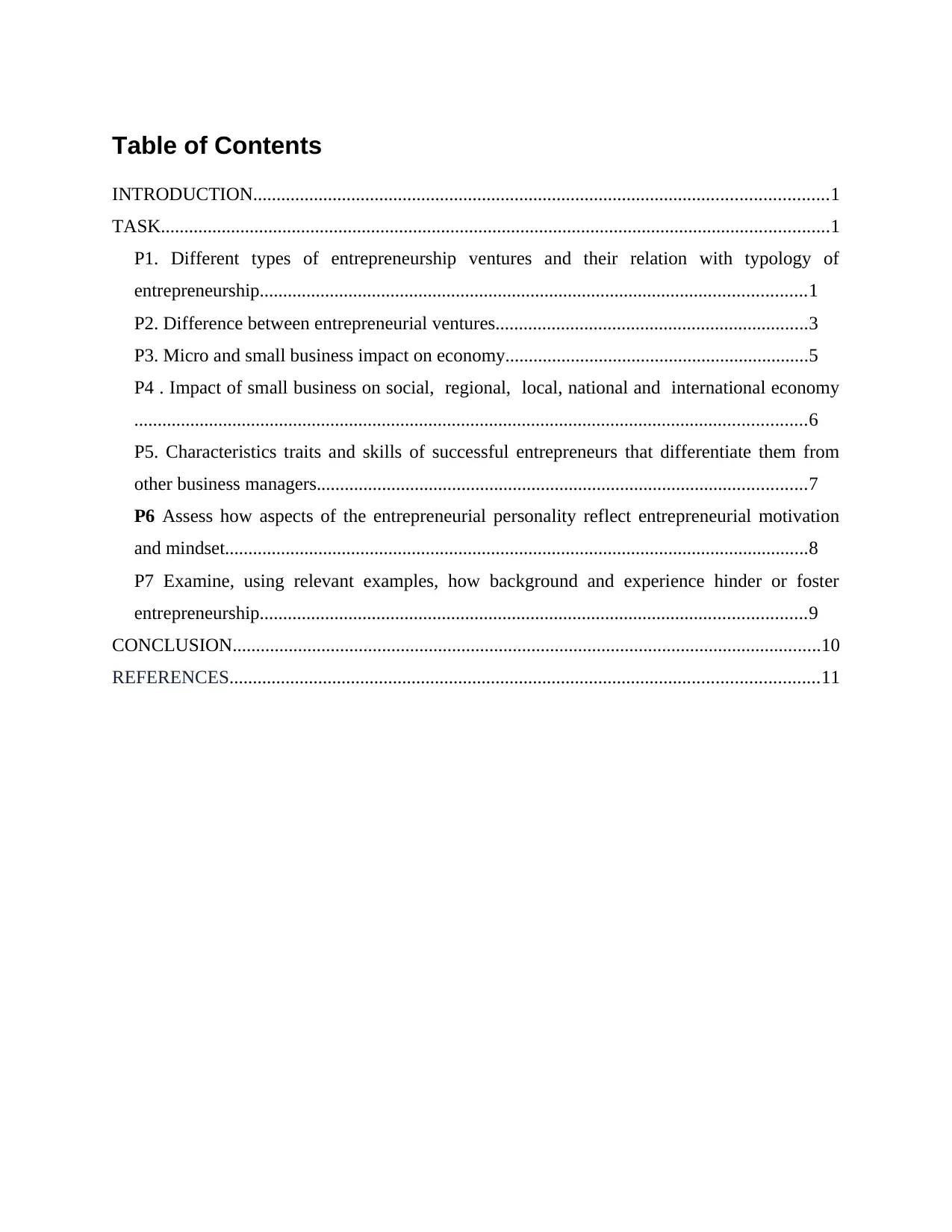
Table of Contents
INTRODUCTION...........................................................................................................................1
TASK...............................................................................................................................................1
P1. Different types of entrepreneurship ventures and their relation with typology of
entrepreneurship.....................................................................................................................1
P2. Difference between entrepreneurial ventures...................................................................3
P3. Micro and small business impact on economy.................................................................5
P4 . Impact of small business on social, regional, local, national and international economy
................................................................................................................................................6
P5. Characteristics traits and skills of successful entrepreneurs that differentiate them from
other business managers.........................................................................................................7
P6 Assess how aspects of the entrepreneurial personality reflect entrepreneurial motivation
and mindset.............................................................................................................................8
P7 Examine, using relevant examples, how background and experience hinder or foster
entrepreneurship.....................................................................................................................9
CONCLUSION..............................................................................................................................10
REFERENCES..............................................................................................................................11
INTRODUCTION...........................................................................................................................1
TASK...............................................................................................................................................1
P1. Different types of entrepreneurship ventures and their relation with typology of
entrepreneurship.....................................................................................................................1
P2. Difference between entrepreneurial ventures...................................................................3
P3. Micro and small business impact on economy.................................................................5
P4 . Impact of small business on social, regional, local, national and international economy
................................................................................................................................................6
P5. Characteristics traits and skills of successful entrepreneurs that differentiate them from
other business managers.........................................................................................................7
P6 Assess how aspects of the entrepreneurial personality reflect entrepreneurial motivation
and mindset.............................................................................................................................8
P7 Examine, using relevant examples, how background and experience hinder or foster
entrepreneurship.....................................................................................................................9
CONCLUSION..............................................................................................................................10
REFERENCES..............................................................................................................................11
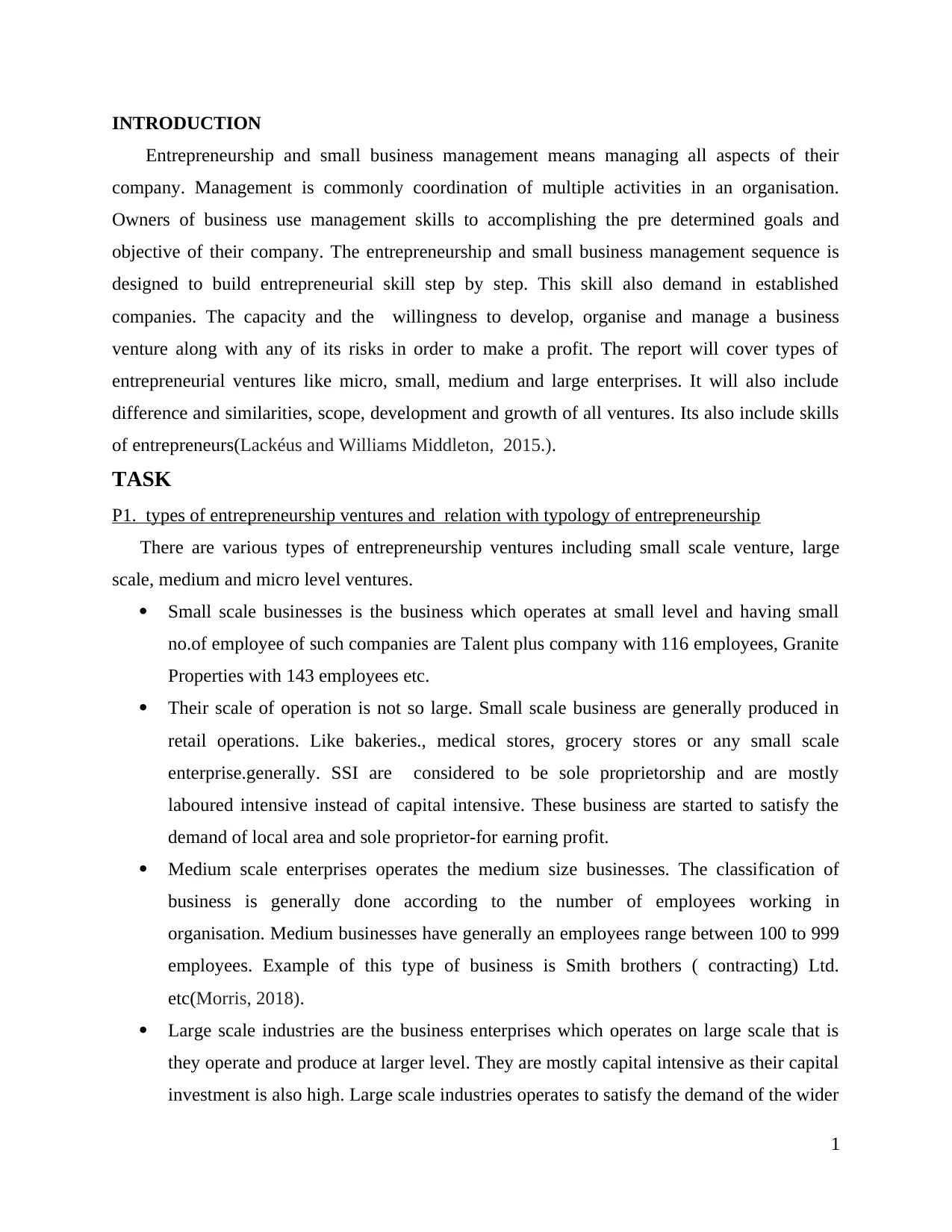
INTRODUCTION
Entrepreneurship and small business management means managing all aspects of their
company. Management is commonly coordination of multiple activities in an organisation.
Owners of business use management skills to accomplishing the pre determined goals and
objective of their company. The entrepreneurship and small business management sequence is
designed to build entrepreneurial skill step by step. This skill also demand in established
companies. The capacity and the willingness to develop, organise and manage a business
venture along with any of its risks in order to make a profit. The report will cover types of
entrepreneurial ventures like micro, small, medium and large enterprises. It will also include
difference and similarities, scope, development and growth of all ventures. Its also include skills
of entrepreneurs(Lackéus and Williams Middleton, 2015.).
TASK
P1. types of entrepreneurship ventures and relation with typology of entrepreneurship
There are various types of entrepreneurship ventures including small scale venture, large
scale, medium and micro level ventures.
Small scale businesses is the business which operates at small level and having small
no.of employee of such companies are Talent plus company with 116 employees, Granite
Properties with 143 employees etc.
Their scale of operation is not so large. Small scale business are generally produced in
retail operations. Like bakeries., medical stores, grocery stores or any small scale
enterprise.generally. SSI are considered to be sole proprietorship and are mostly
laboured intensive instead of capital intensive. These business are started to satisfy the
demand of local area and sole proprietor-for earning profit.
Medium scale enterprises operates the medium size businesses. The classification of
business is generally done according to the number of employees working in
organisation. Medium businesses have generally an employees range between 100 to 999
employees. Example of this type of business is Smith brothers ( contracting) Ltd.
etc(Morris, 2018).
Large scale industries are the business enterprises which operates on large scale that is
they operate and produce at larger level. They are mostly capital intensive as their capital
investment is also high. Large scale industries operates to satisfy the demand of the wider
1
Entrepreneurship and small business management means managing all aspects of their
company. Management is commonly coordination of multiple activities in an organisation.
Owners of business use management skills to accomplishing the pre determined goals and
objective of their company. The entrepreneurship and small business management sequence is
designed to build entrepreneurial skill step by step. This skill also demand in established
companies. The capacity and the willingness to develop, organise and manage a business
venture along with any of its risks in order to make a profit. The report will cover types of
entrepreneurial ventures like micro, small, medium and large enterprises. It will also include
difference and similarities, scope, development and growth of all ventures. Its also include skills
of entrepreneurs(Lackéus and Williams Middleton, 2015.).
TASK
P1. types of entrepreneurship ventures and relation with typology of entrepreneurship
There are various types of entrepreneurship ventures including small scale venture, large
scale, medium and micro level ventures.
Small scale businesses is the business which operates at small level and having small
no.of employee of such companies are Talent plus company with 116 employees, Granite
Properties with 143 employees etc.
Their scale of operation is not so large. Small scale business are generally produced in
retail operations. Like bakeries., medical stores, grocery stores or any small scale
enterprise.generally. SSI are considered to be sole proprietorship and are mostly
laboured intensive instead of capital intensive. These business are started to satisfy the
demand of local area and sole proprietor-for earning profit.
Medium scale enterprises operates the medium size businesses. The classification of
business is generally done according to the number of employees working in
organisation. Medium businesses have generally an employees range between 100 to 999
employees. Example of this type of business is Smith brothers ( contracting) Ltd.
etc(Morris, 2018).
Large scale industries are the business enterprises which operates on large scale that is
they operate and produce at larger level. They are mostly capital intensive as their capital
investment is also high. Large scale industries operates to satisfy the demand of the wider
1
⊘ This is a preview!⊘
Do you want full access?
Subscribe today to unlock all pages.

Trusted by 1+ million students worldwide
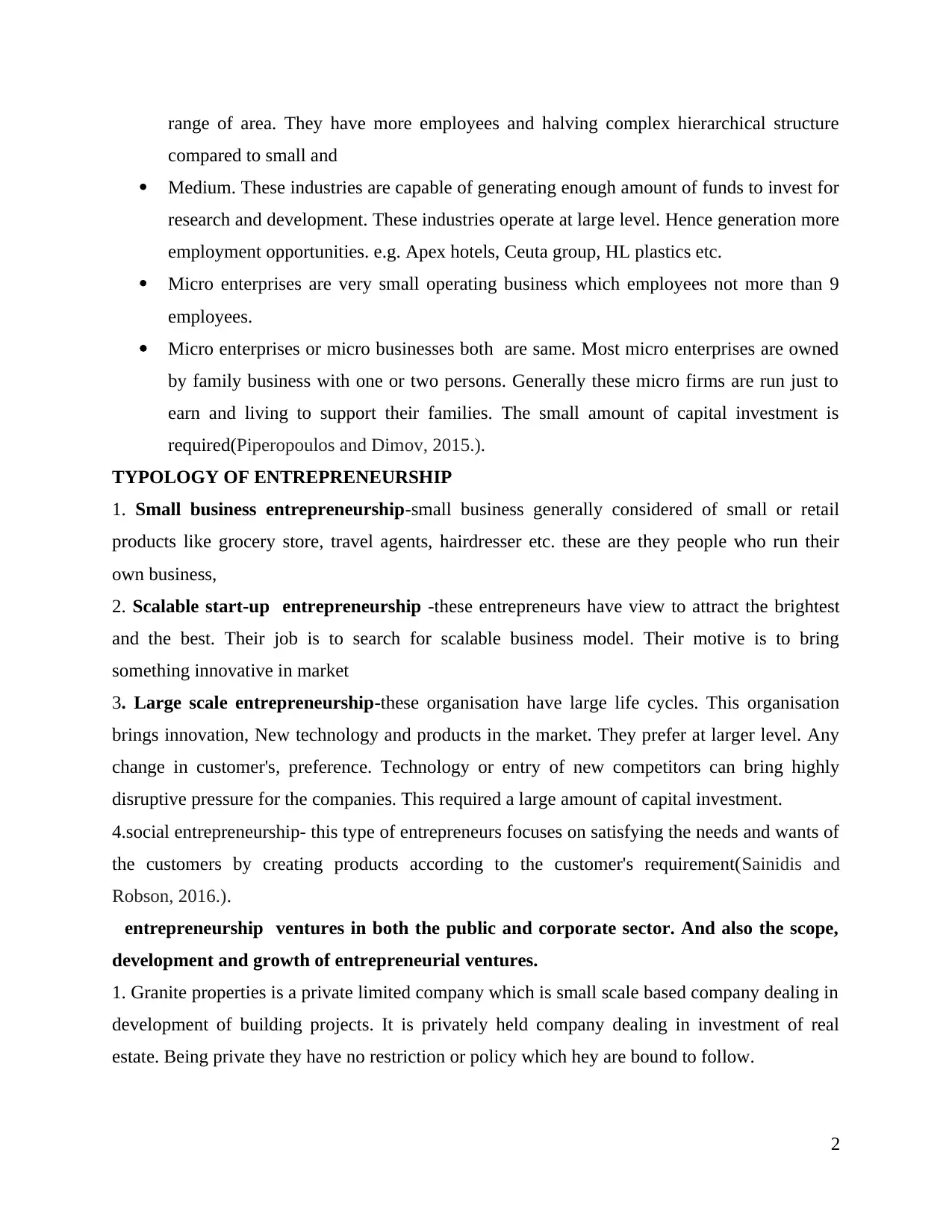
range of area. They have more employees and halving complex hierarchical structure
compared to small and
Medium. These industries are capable of generating enough amount of funds to invest for
research and development. These industries operate at large level. Hence generation more
employment opportunities. e.g. Apex hotels, Ceuta group, HL plastics etc.
Micro enterprises are very small operating business which employees not more than 9
employees.
Micro enterprises or micro businesses both are same. Most micro enterprises are owned
by family business with one or two persons. Generally these micro firms are run just to
earn and living to support their families. The small amount of capital investment is
required(Piperopoulos and Dimov, 2015.).
TYPOLOGY OF ENTREPRENEURSHIP
1. Small business entrepreneurship-small business generally considered of small or retail
products like grocery store, travel agents, hairdresser etc. these are they people who run their
own business,
2. Scalable start-up entrepreneurship -these entrepreneurs have view to attract the brightest
and the best. Their job is to search for scalable business model. Their motive is to bring
something innovative in market
3. Large scale entrepreneurship-these organisation have large life cycles. This organisation
brings innovation, New technology and products in the market. They prefer at larger level. Any
change in customer's, preference. Technology or entry of new competitors can bring highly
disruptive pressure for the companies. This required a large amount of capital investment.
4.social entrepreneurship- this type of entrepreneurs focuses on satisfying the needs and wants of
the customers by creating products according to the customer's requirement(Sainidis and
Robson, 2016.).
entrepreneurship ventures in both the public and corporate sector. And also the scope,
development and growth of entrepreneurial ventures.
1. Granite properties is a private limited company which is small scale based company dealing in
development of building projects. It is privately held company dealing in investment of real
estate. Being private they have no restriction or policy which hey are bound to follow.
2
compared to small and
Medium. These industries are capable of generating enough amount of funds to invest for
research and development. These industries operate at large level. Hence generation more
employment opportunities. e.g. Apex hotels, Ceuta group, HL plastics etc.
Micro enterprises are very small operating business which employees not more than 9
employees.
Micro enterprises or micro businesses both are same. Most micro enterprises are owned
by family business with one or two persons. Generally these micro firms are run just to
earn and living to support their families. The small amount of capital investment is
required(Piperopoulos and Dimov, 2015.).
TYPOLOGY OF ENTREPRENEURSHIP
1. Small business entrepreneurship-small business generally considered of small or retail
products like grocery store, travel agents, hairdresser etc. these are they people who run their
own business,
2. Scalable start-up entrepreneurship -these entrepreneurs have view to attract the brightest
and the best. Their job is to search for scalable business model. Their motive is to bring
something innovative in market
3. Large scale entrepreneurship-these organisation have large life cycles. This organisation
brings innovation, New technology and products in the market. They prefer at larger level. Any
change in customer's, preference. Technology or entry of new competitors can bring highly
disruptive pressure for the companies. This required a large amount of capital investment.
4.social entrepreneurship- this type of entrepreneurs focuses on satisfying the needs and wants of
the customers by creating products according to the customer's requirement(Sainidis and
Robson, 2016.).
entrepreneurship ventures in both the public and corporate sector. And also the scope,
development and growth of entrepreneurial ventures.
1. Granite properties is a private limited company which is small scale based company dealing in
development of building projects. It is privately held company dealing in investment of real
estate. Being private they have no restriction or policy which hey are bound to follow.
2
Paraphrase This Document
Need a fresh take? Get an instant paraphrase of this document with our AI Paraphraser
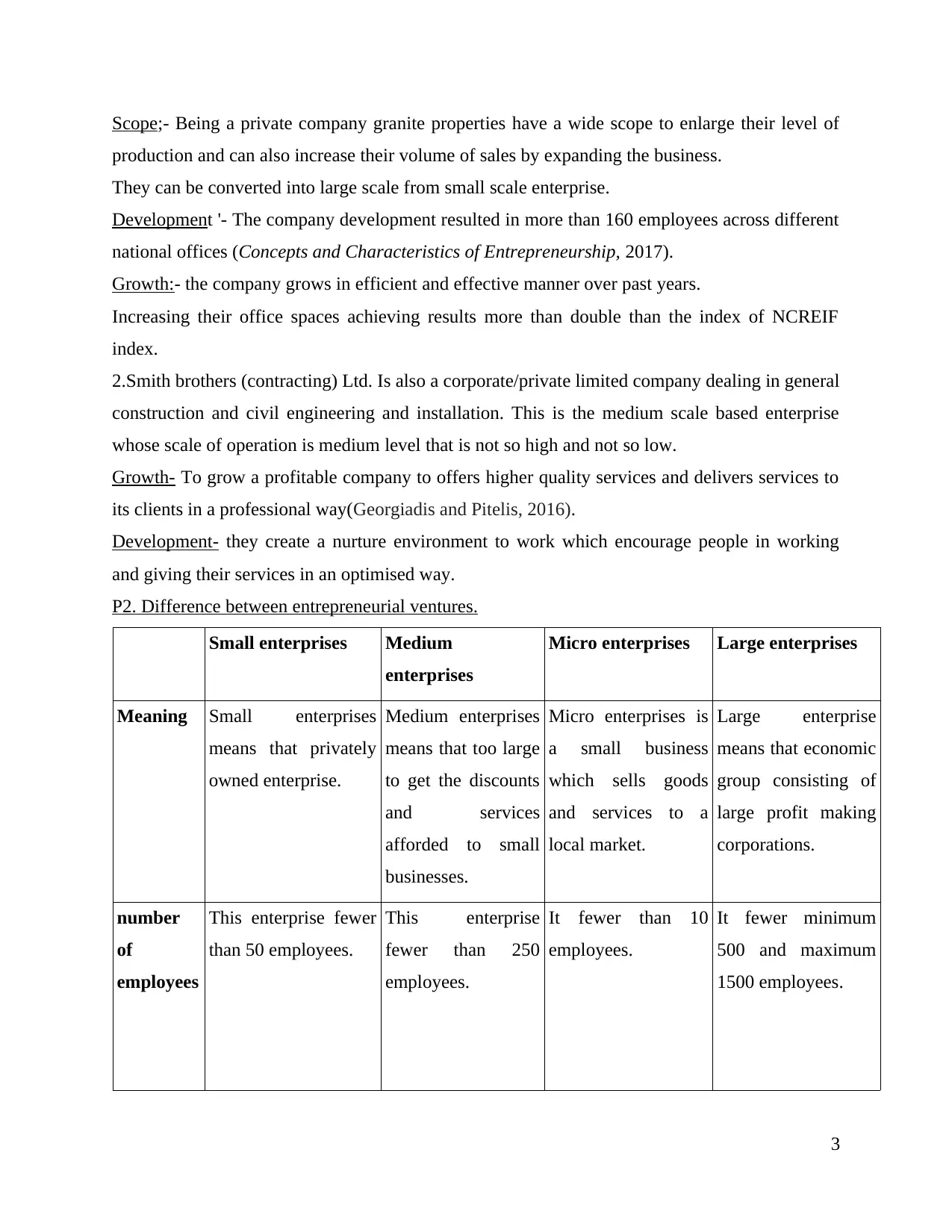
Scope;- Being a private company granite properties have a wide scope to enlarge their level of
production and can also increase their volume of sales by expanding the business.
They can be converted into large scale from small scale enterprise.
Development '- The company development resulted in more than 160 employees across different
national offices (Concepts and Characteristics of Entrepreneurship, 2017).
Growth:- the company grows in efficient and effective manner over past years.
Increasing their office spaces achieving results more than double than the index of NCREIF
index.
2.Smith brothers (contracting) Ltd. Is also a corporate/private limited company dealing in general
construction and civil engineering and installation. This is the medium scale based enterprise
whose scale of operation is medium level that is not so high and not so low.
Growth- To grow a profitable company to offers higher quality services and delivers services to
its clients in a professional way(Georgiadis and Pitelis, 2016).
Development- they create a nurture environment to work which encourage people in working
and giving their services in an optimised way.
P2. Difference between entrepreneurial ventures.
Small enterprises Medium
enterprises
Micro enterprises Large enterprises
Meaning Small enterprises
means that privately
owned enterprise.
Medium enterprises
means that too large
to get the discounts
and services
afforded to small
businesses.
Micro enterprises is
a small business
which sells goods
and services to a
local market.
Large enterprise
means that economic
group consisting of
large profit making
corporations.
number
of
employees
This enterprise fewer
than 50 employees.
This enterprise
fewer than 250
employees.
It fewer than 10
employees.
It fewer minimum
500 and maximum
1500 employees.
3
production and can also increase their volume of sales by expanding the business.
They can be converted into large scale from small scale enterprise.
Development '- The company development resulted in more than 160 employees across different
national offices (Concepts and Characteristics of Entrepreneurship, 2017).
Growth:- the company grows in efficient and effective manner over past years.
Increasing their office spaces achieving results more than double than the index of NCREIF
index.
2.Smith brothers (contracting) Ltd. Is also a corporate/private limited company dealing in general
construction and civil engineering and installation. This is the medium scale based enterprise
whose scale of operation is medium level that is not so high and not so low.
Growth- To grow a profitable company to offers higher quality services and delivers services to
its clients in a professional way(Georgiadis and Pitelis, 2016).
Development- they create a nurture environment to work which encourage people in working
and giving their services in an optimised way.
P2. Difference between entrepreneurial ventures.
Small enterprises Medium
enterprises
Micro enterprises Large enterprises
Meaning Small enterprises
means that privately
owned enterprise.
Medium enterprises
means that too large
to get the discounts
and services
afforded to small
businesses.
Micro enterprises is
a small business
which sells goods
and services to a
local market.
Large enterprise
means that economic
group consisting of
large profit making
corporations.
number
of
employees
This enterprise fewer
than 50 employees.
This enterprise
fewer than 250
employees.
It fewer than 10
employees.
It fewer minimum
500 and maximum
1500 employees.
3
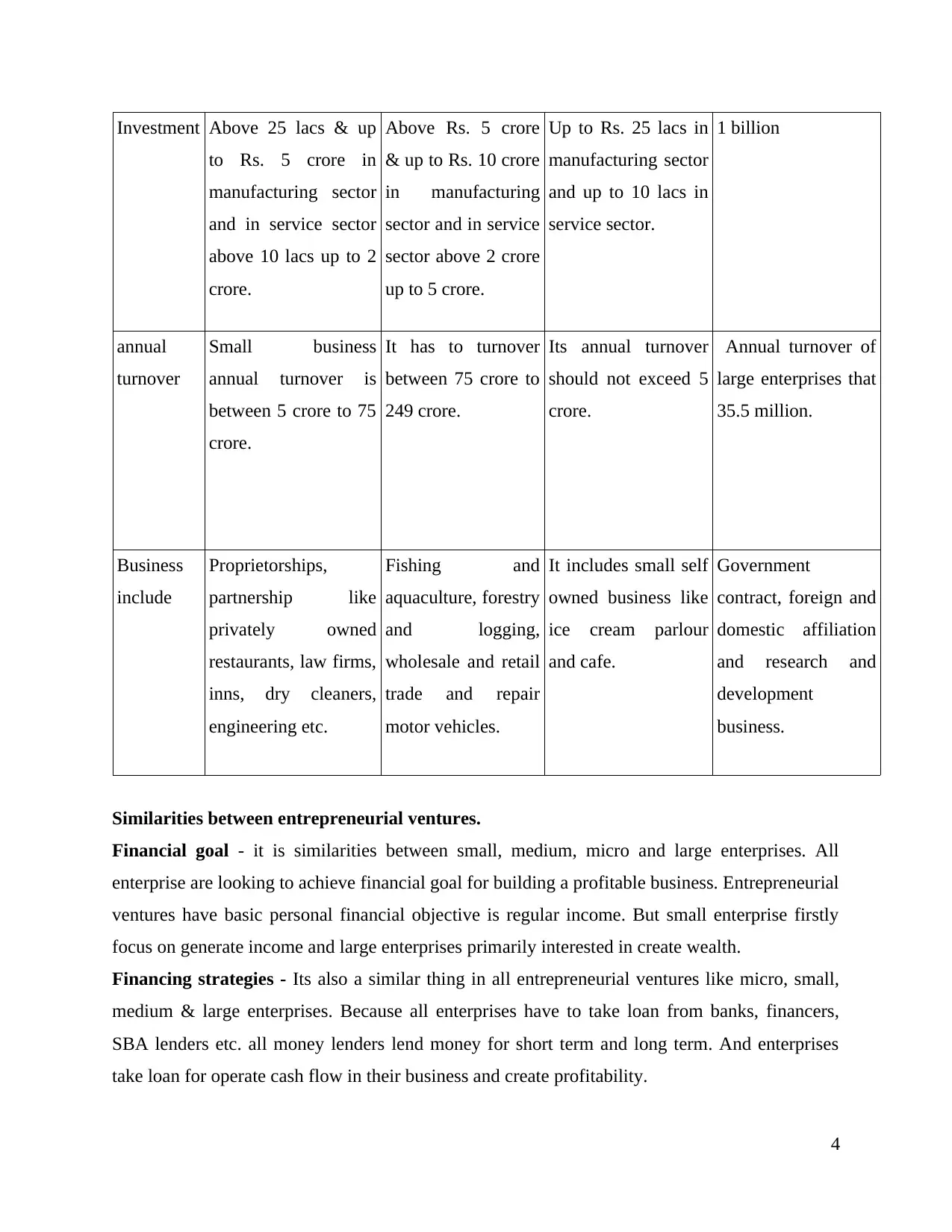
Investment Above 25 lacs & up
to Rs. 5 crore in
manufacturing sector
and in service sector
above 10 lacs up to 2
crore.
Above Rs. 5 crore
& up to Rs. 10 crore
in manufacturing
sector and in service
sector above 2 crore
up to 5 crore.
Up to Rs. 25 lacs in
manufacturing sector
and up to 10 lacs in
service sector.
1 billion
annual
turnover
Small business
annual turnover is
between 5 crore to 75
crore.
It has to turnover
between 75 crore to
249 crore.
Its annual turnover
should not exceed 5
crore.
Annual turnover of
large enterprises that
35.5 million.
Business
include
Proprietorships,
partnership like
privately owned
restaurants, law firms,
inns, dry cleaners,
engineering etc.
Fishing and
aquaculture, forestry
and logging,
wholesale and retail
trade and repair
motor vehicles.
It includes small self
owned business like
ice cream parlour
and cafe.
Government
contract, foreign and
domestic affiliation
and research and
development
business.
Similarities between entrepreneurial ventures.
Financial goal - it is similarities between small, medium, micro and large enterprises. All
enterprise are looking to achieve financial goal for building a profitable business. Entrepreneurial
ventures have basic personal financial objective is regular income. But small enterprise firstly
focus on generate income and large enterprises primarily interested in create wealth.
Financing strategies - Its also a similar thing in all entrepreneurial ventures like micro, small,
medium & large enterprises. Because all enterprises have to take loan from banks, financers,
SBA lenders etc. all money lenders lend money for short term and long term. And enterprises
take loan for operate cash flow in their business and create profitability.
4
to Rs. 5 crore in
manufacturing sector
and in service sector
above 10 lacs up to 2
crore.
Above Rs. 5 crore
& up to Rs. 10 crore
in manufacturing
sector and in service
sector above 2 crore
up to 5 crore.
Up to Rs. 25 lacs in
manufacturing sector
and up to 10 lacs in
service sector.
1 billion
annual
turnover
Small business
annual turnover is
between 5 crore to 75
crore.
It has to turnover
between 75 crore to
249 crore.
Its annual turnover
should not exceed 5
crore.
Annual turnover of
large enterprises that
35.5 million.
Business
include
Proprietorships,
partnership like
privately owned
restaurants, law firms,
inns, dry cleaners,
engineering etc.
Fishing and
aquaculture, forestry
and logging,
wholesale and retail
trade and repair
motor vehicles.
It includes small self
owned business like
ice cream parlour
and cafe.
Government
contract, foreign and
domestic affiliation
and research and
development
business.
Similarities between entrepreneurial ventures.
Financial goal - it is similarities between small, medium, micro and large enterprises. All
enterprise are looking to achieve financial goal for building a profitable business. Entrepreneurial
ventures have basic personal financial objective is regular income. But small enterprise firstly
focus on generate income and large enterprises primarily interested in create wealth.
Financing strategies - Its also a similar thing in all entrepreneurial ventures like micro, small,
medium & large enterprises. Because all enterprises have to take loan from banks, financers,
SBA lenders etc. all money lenders lend money for short term and long term. And enterprises
take loan for operate cash flow in their business and create profitability.
4
⊘ This is a preview!⊘
Do you want full access?
Subscribe today to unlock all pages.

Trusted by 1+ million students worldwide
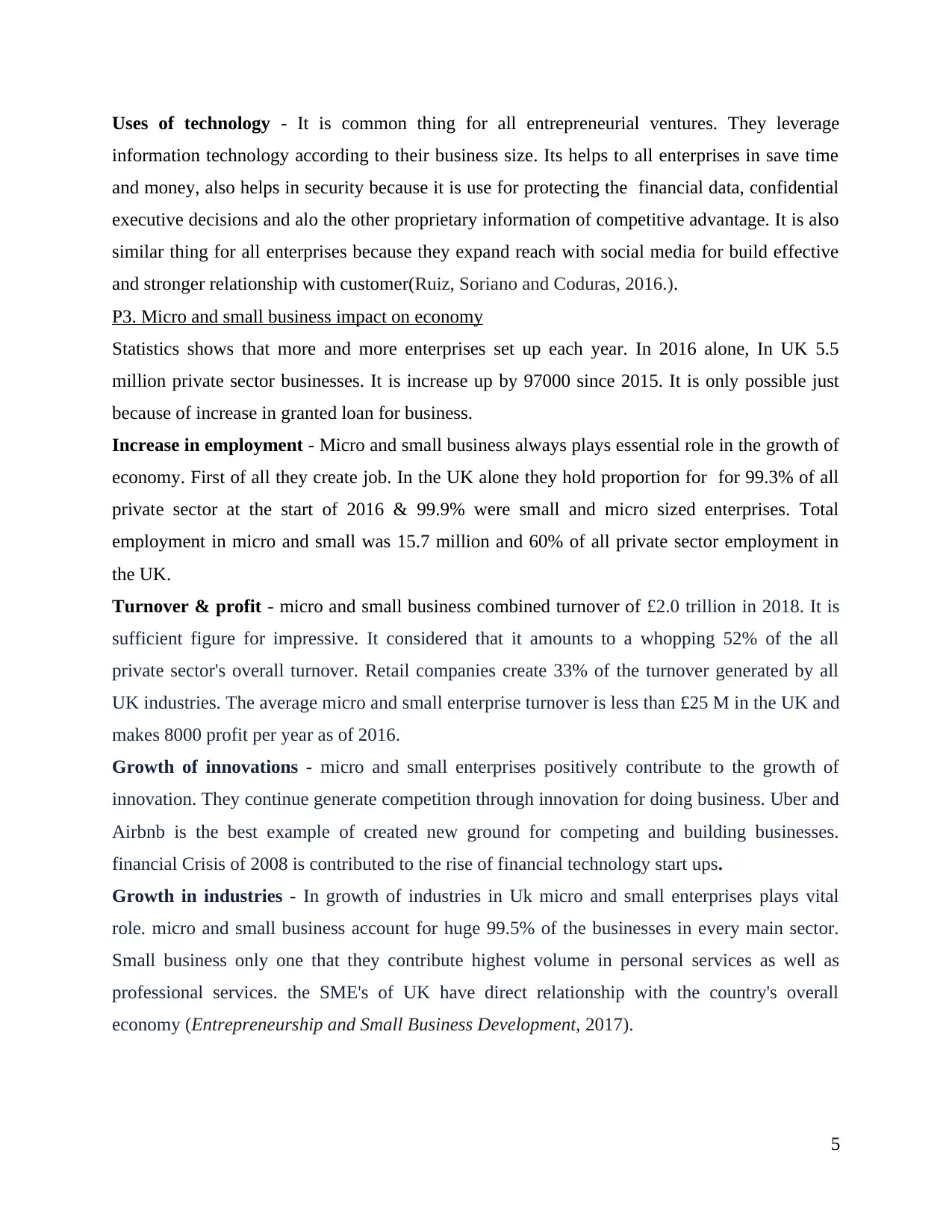
Uses of technology - It is common thing for all entrepreneurial ventures. They leverage
information technology according to their business size. Its helps to all enterprises in save time
and money, also helps in security because it is use for protecting the financial data, confidential
executive decisions and alo the other proprietary information of competitive advantage. It is also
similar thing for all enterprises because they expand reach with social media for build effective
and stronger relationship with customer(Ruiz, Soriano and Coduras, 2016.).
P3. Micro and small business impact on economy
Statistics shows that more and more enterprises set up each year. In 2016 alone, In UK 5.5
million private sector businesses. It is increase up by 97000 since 2015. It is only possible just
because of increase in granted loan for business.
Increase in employment - Micro and small business always plays essential role in the growth of
economy. First of all they create job. In the UK alone they hold proportion for for 99.3% of all
private sector at the start of 2016 & 99.9% were small and micro sized enterprises. Total
employment in micro and small was 15.7 million and 60% of all private sector employment in
the UK.
Turnover & profit - micro and small business combined turnover of £2.0 trillion in 2018. It is
sufficient figure for impressive. It considered that it amounts to a whopping 52% of the all
private sector's overall turnover. Retail companies create 33% of the turnover generated by all
UK industries. The average micro and small enterprise turnover is less than £25 M in the UK and
makes 8000 profit per year as of 2016.
Growth of innovations - micro and small enterprises positively contribute to the growth of
innovation. They continue generate competition through innovation for doing business. Uber and
Airbnb is the best example of created new ground for competing and building businesses.
financial Crisis of 2008 is contributed to the rise of financial technology start ups.
Growth in industries - In growth of industries in Uk micro and small enterprises plays vital
role. micro and small business account for huge 99.5% of the businesses in every main sector.
Small business only one that they contribute highest volume in personal services as well as
professional services. the SME's of UK have direct relationship with the country's overall
economy (Entrepreneurship and Small Business Development, 2017).
5
information technology according to their business size. Its helps to all enterprises in save time
and money, also helps in security because it is use for protecting the financial data, confidential
executive decisions and alo the other proprietary information of competitive advantage. It is also
similar thing for all enterprises because they expand reach with social media for build effective
and stronger relationship with customer(Ruiz, Soriano and Coduras, 2016.).
P3. Micro and small business impact on economy
Statistics shows that more and more enterprises set up each year. In 2016 alone, In UK 5.5
million private sector businesses. It is increase up by 97000 since 2015. It is only possible just
because of increase in granted loan for business.
Increase in employment - Micro and small business always plays essential role in the growth of
economy. First of all they create job. In the UK alone they hold proportion for for 99.3% of all
private sector at the start of 2016 & 99.9% were small and micro sized enterprises. Total
employment in micro and small was 15.7 million and 60% of all private sector employment in
the UK.
Turnover & profit - micro and small business combined turnover of £2.0 trillion in 2018. It is
sufficient figure for impressive. It considered that it amounts to a whopping 52% of the all
private sector's overall turnover. Retail companies create 33% of the turnover generated by all
UK industries. The average micro and small enterprise turnover is less than £25 M in the UK and
makes 8000 profit per year as of 2016.
Growth of innovations - micro and small enterprises positively contribute to the growth of
innovation. They continue generate competition through innovation for doing business. Uber and
Airbnb is the best example of created new ground for competing and building businesses.
financial Crisis of 2008 is contributed to the rise of financial technology start ups.
Growth in industries - In growth of industries in Uk micro and small enterprises plays vital
role. micro and small business account for huge 99.5% of the businesses in every main sector.
Small business only one that they contribute highest volume in personal services as well as
professional services. the SME's of UK have direct relationship with the country's overall
economy (Entrepreneurship and Small Business Development, 2017).
5
Paraphrase This Document
Need a fresh take? Get an instant paraphrase of this document with our AI Paraphraser
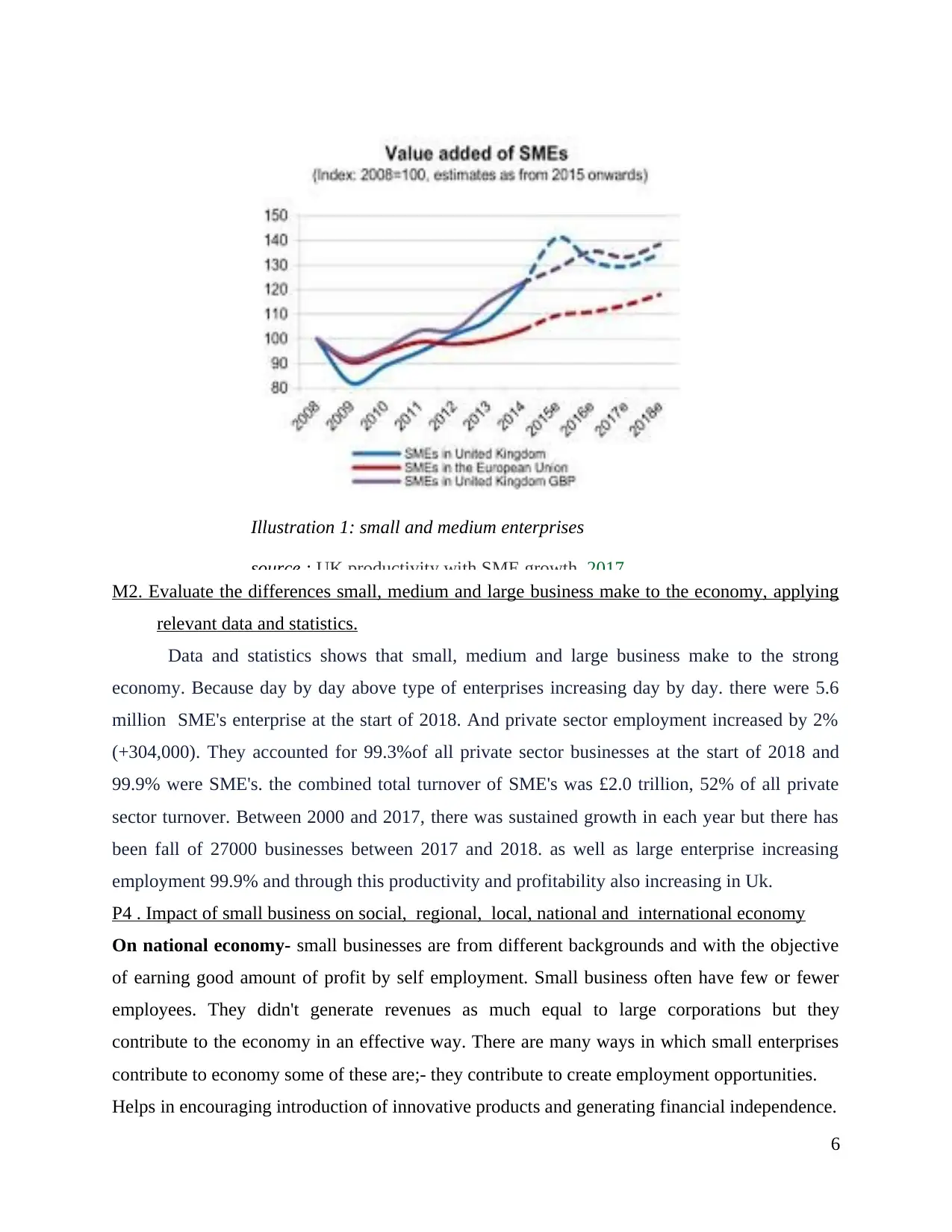
M2. Evaluate the differences small, medium and large business make to the economy, applying
relevant data and statistics.
Data and statistics shows that small, medium and large business make to the strong
economy. Because day by day above type of enterprises increasing day by day. there were 5.6
million SME's enterprise at the start of 2018. And private sector employment increased by 2%
(+304,000). They accounted for 99.3%of all private sector businesses at the start of 2018 and
99.9% were SME's. the combined total turnover of SME's was £2.0 trillion, 52% of all private
sector turnover. Between 2000 and 2017, there was sustained growth in each year but there has
been fall of 27000 businesses between 2017 and 2018. as well as large enterprise increasing
employment 99.9% and through this productivity and profitability also increasing in Uk.
P4 . Impact of small business on social, regional, local, national and international economy
On national economy- small businesses are from different backgrounds and with the objective
of earning good amount of profit by self employment. Small business often have few or fewer
employees. They didn't generate revenues as much equal to large corporations but they
contribute to the economy in an effective way. There are many ways in which small enterprises
contribute to economy some of these are;- they contribute to create employment opportunities.
Helps in encouraging introduction of innovative products and generating financial independence.
6
Illustration 1: small and medium enterprises
source : UK productivity with SME growth, 2017
relevant data and statistics.
Data and statistics shows that small, medium and large business make to the strong
economy. Because day by day above type of enterprises increasing day by day. there were 5.6
million SME's enterprise at the start of 2018. And private sector employment increased by 2%
(+304,000). They accounted for 99.3%of all private sector businesses at the start of 2018 and
99.9% were SME's. the combined total turnover of SME's was £2.0 trillion, 52% of all private
sector turnover. Between 2000 and 2017, there was sustained growth in each year but there has
been fall of 27000 businesses between 2017 and 2018. as well as large enterprise increasing
employment 99.9% and through this productivity and profitability also increasing in Uk.
P4 . Impact of small business on social, regional, local, national and international economy
On national economy- small businesses are from different backgrounds and with the objective
of earning good amount of profit by self employment. Small business often have few or fewer
employees. They didn't generate revenues as much equal to large corporations but they
contribute to the economy in an effective way. There are many ways in which small enterprises
contribute to economy some of these are;- they contribute to create employment opportunities.
Helps in encouraging introduction of innovative products and generating financial independence.
6
Illustration 1: small and medium enterprises
source : UK productivity with SME growth, 2017
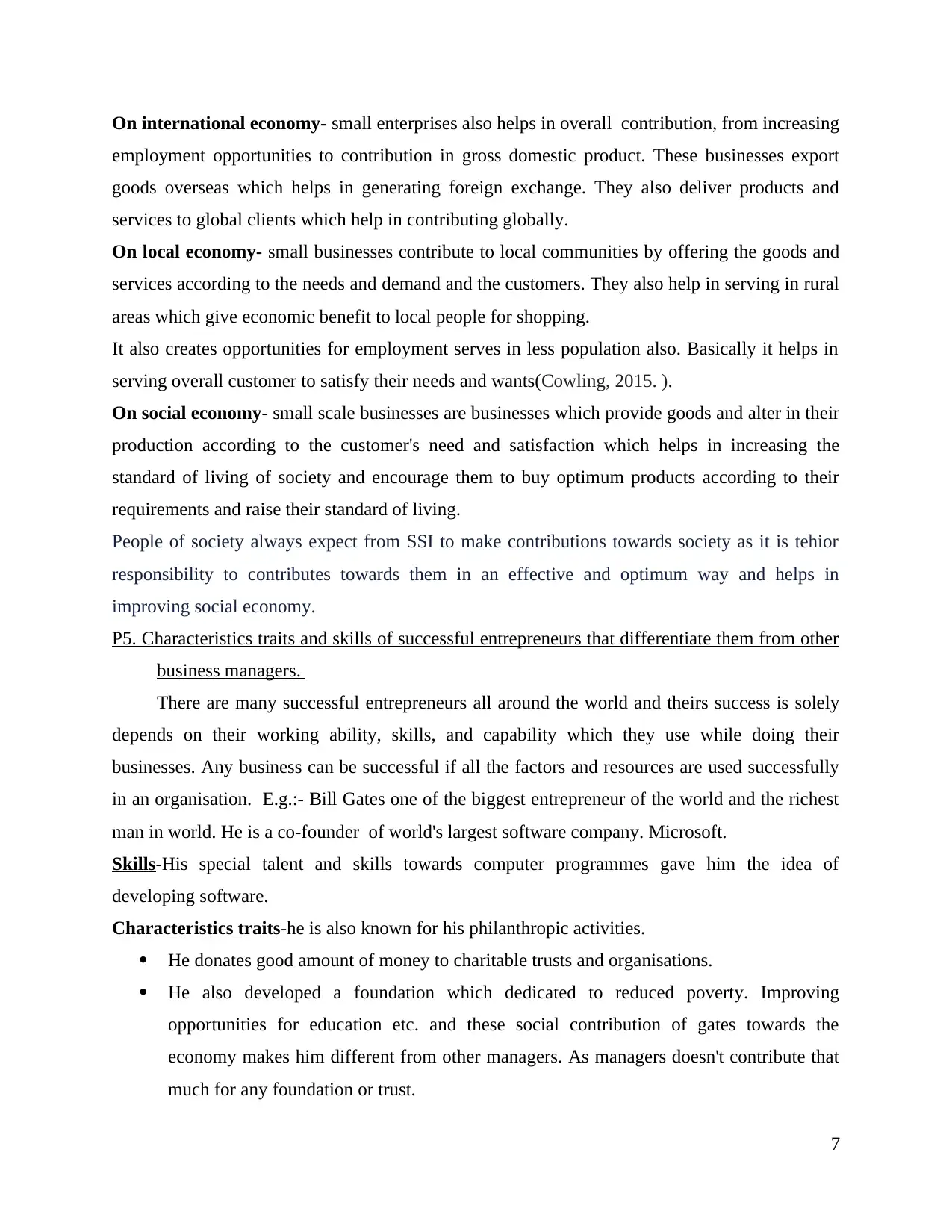
On international economy- small enterprises also helps in overall contribution, from increasing
employment opportunities to contribution in gross domestic product. These businesses export
goods overseas which helps in generating foreign exchange. They also deliver products and
services to global clients which help in contributing globally.
On local economy- small businesses contribute to local communities by offering the goods and
services according to the needs and demand and the customers. They also help in serving in rural
areas which give economic benefit to local people for shopping.
It also creates opportunities for employment serves in less population also. Basically it helps in
serving overall customer to satisfy their needs and wants(Cowling, 2015. ).
On social economy- small scale businesses are businesses which provide goods and alter in their
production according to the customer's need and satisfaction which helps in increasing the
standard of living of society and encourage them to buy optimum products according to their
requirements and raise their standard of living.
People of society always expect from SSI to make contributions towards society as it is tehior
responsibility to contributes towards them in an effective and optimum way and helps in
improving social economy.
P5. Characteristics traits and skills of successful entrepreneurs that differentiate them from other
business managers.
There are many successful entrepreneurs all around the world and theirs success is solely
depends on their working ability, skills, and capability which they use while doing their
businesses. Any business can be successful if all the factors and resources are used successfully
in an organisation. E.g.:- Bill Gates one of the biggest entrepreneur of the world and the richest
man in world. He is a co-founder of world's largest software company. Microsoft.
Skills-His special talent and skills towards computer programmes gave him the idea of
developing software.
Characteristics traits-he is also known for his philanthropic activities.
He donates good amount of money to charitable trusts and organisations.
He also developed a foundation which dedicated to reduced poverty. Improving
opportunities for education etc. and these social contribution of gates towards the
economy makes him different from other managers. As managers doesn't contribute that
much for any foundation or trust.
7
employment opportunities to contribution in gross domestic product. These businesses export
goods overseas which helps in generating foreign exchange. They also deliver products and
services to global clients which help in contributing globally.
On local economy- small businesses contribute to local communities by offering the goods and
services according to the needs and demand and the customers. They also help in serving in rural
areas which give economic benefit to local people for shopping.
It also creates opportunities for employment serves in less population also. Basically it helps in
serving overall customer to satisfy their needs and wants(Cowling, 2015. ).
On social economy- small scale businesses are businesses which provide goods and alter in their
production according to the customer's need and satisfaction which helps in increasing the
standard of living of society and encourage them to buy optimum products according to their
requirements and raise their standard of living.
People of society always expect from SSI to make contributions towards society as it is tehior
responsibility to contributes towards them in an effective and optimum way and helps in
improving social economy.
P5. Characteristics traits and skills of successful entrepreneurs that differentiate them from other
business managers.
There are many successful entrepreneurs all around the world and theirs success is solely
depends on their working ability, skills, and capability which they use while doing their
businesses. Any business can be successful if all the factors and resources are used successfully
in an organisation. E.g.:- Bill Gates one of the biggest entrepreneur of the world and the richest
man in world. He is a co-founder of world's largest software company. Microsoft.
Skills-His special talent and skills towards computer programmes gave him the idea of
developing software.
Characteristics traits-he is also known for his philanthropic activities.
He donates good amount of money to charitable trusts and organisations.
He also developed a foundation which dedicated to reduced poverty. Improving
opportunities for education etc. and these social contribution of gates towards the
economy makes him different from other managers. As managers doesn't contribute that
much for any foundation or trust.
7
⊘ This is a preview!⊘
Do you want full access?
Subscribe today to unlock all pages.

Trusted by 1+ million students worldwide
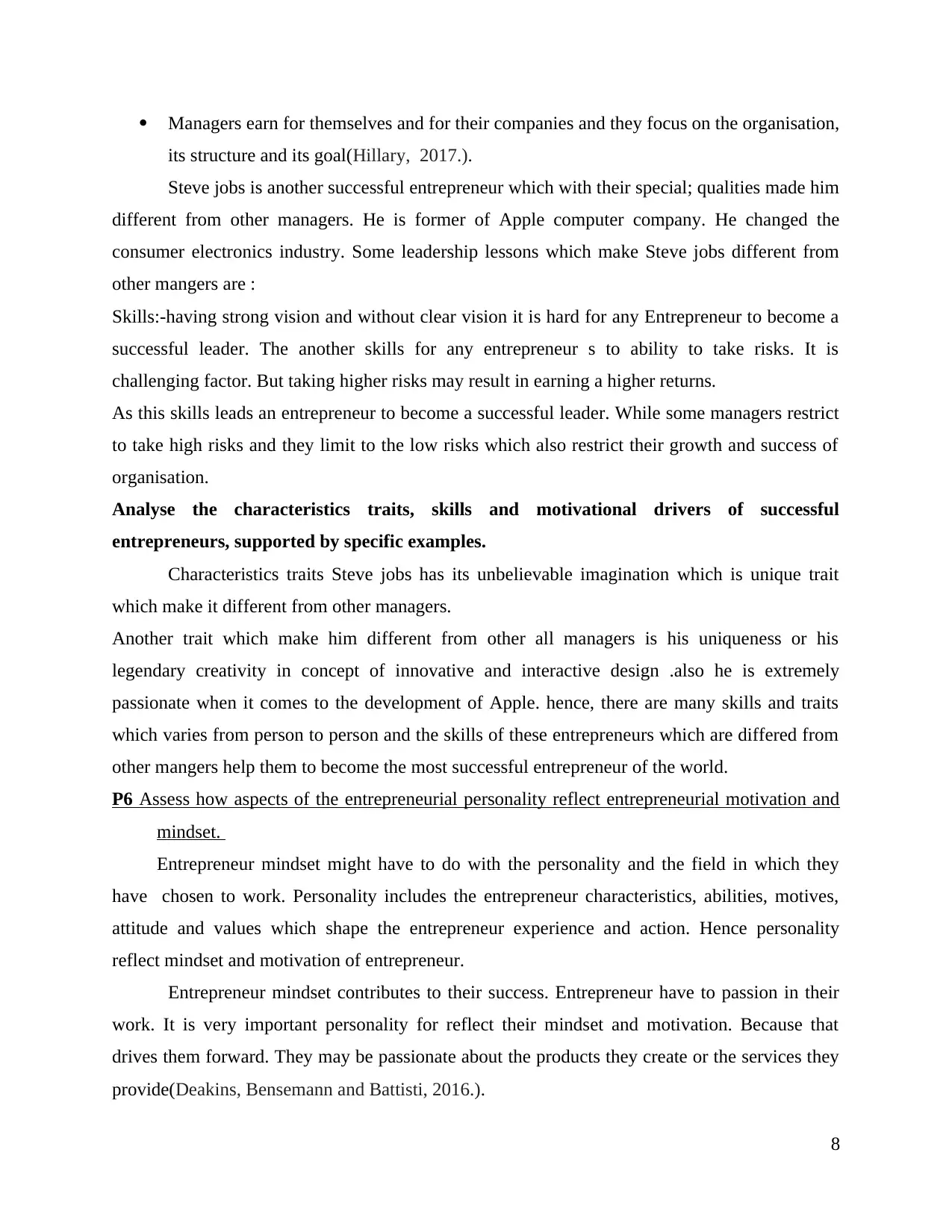
Managers earn for themselves and for their companies and they focus on the organisation,
its structure and its goal(Hillary, 2017.).
Steve jobs is another successful entrepreneur which with their special; qualities made him
different from other managers. He is former of Apple computer company. He changed the
consumer electronics industry. Some leadership lessons which make Steve jobs different from
other mangers are :
Skills:-having strong vision and without clear vision it is hard for any Entrepreneur to become a
successful leader. The another skills for any entrepreneur s to ability to take risks. It is
challenging factor. But taking higher risks may result in earning a higher returns.
As this skills leads an entrepreneur to become a successful leader. While some managers restrict
to take high risks and they limit to the low risks which also restrict their growth and success of
organisation.
Analyse the characteristics traits, skills and motivational drivers of successful
entrepreneurs, supported by specific examples.
Characteristics traits Steve jobs has its unbelievable imagination which is unique trait
which make it different from other managers.
Another trait which make him different from other all managers is his uniqueness or his
legendary creativity in concept of innovative and interactive design .also he is extremely
passionate when it comes to the development of Apple. hence, there are many skills and traits
which varies from person to person and the skills of these entrepreneurs which are differed from
other mangers help them to become the most successful entrepreneur of the world.
P6 Assess how aspects of the entrepreneurial personality reflect entrepreneurial motivation and
mindset.
Entrepreneur mindset might have to do with the personality and the field in which they
have chosen to work. Personality includes the entrepreneur characteristics, abilities, motives,
attitude and values which shape the entrepreneur experience and action. Hence personality
reflect mindset and motivation of entrepreneur.
Entrepreneur mindset contributes to their success. Entrepreneur have to passion in their
work. It is very important personality for reflect their mindset and motivation. Because that
drives them forward. They may be passionate about the products they create or the services they
provide(Deakins, Bensemann and Battisti, 2016.).
8
its structure and its goal(Hillary, 2017.).
Steve jobs is another successful entrepreneur which with their special; qualities made him
different from other managers. He is former of Apple computer company. He changed the
consumer electronics industry. Some leadership lessons which make Steve jobs different from
other mangers are :
Skills:-having strong vision and without clear vision it is hard for any Entrepreneur to become a
successful leader. The another skills for any entrepreneur s to ability to take risks. It is
challenging factor. But taking higher risks may result in earning a higher returns.
As this skills leads an entrepreneur to become a successful leader. While some managers restrict
to take high risks and they limit to the low risks which also restrict their growth and success of
organisation.
Analyse the characteristics traits, skills and motivational drivers of successful
entrepreneurs, supported by specific examples.
Characteristics traits Steve jobs has its unbelievable imagination which is unique trait
which make it different from other managers.
Another trait which make him different from other all managers is his uniqueness or his
legendary creativity in concept of innovative and interactive design .also he is extremely
passionate when it comes to the development of Apple. hence, there are many skills and traits
which varies from person to person and the skills of these entrepreneurs which are differed from
other mangers help them to become the most successful entrepreneur of the world.
P6 Assess how aspects of the entrepreneurial personality reflect entrepreneurial motivation and
mindset.
Entrepreneur mindset might have to do with the personality and the field in which they
have chosen to work. Personality includes the entrepreneur characteristics, abilities, motives,
attitude and values which shape the entrepreneur experience and action. Hence personality
reflect mindset and motivation of entrepreneur.
Entrepreneur mindset contributes to their success. Entrepreneur have to passion in their
work. It is very important personality for reflect their mindset and motivation. Because that
drives them forward. They may be passionate about the products they create or the services they
provide(Deakins, Bensemann and Battisti, 2016.).
8
Paraphrase This Document
Need a fresh take? Get an instant paraphrase of this document with our AI Paraphraser
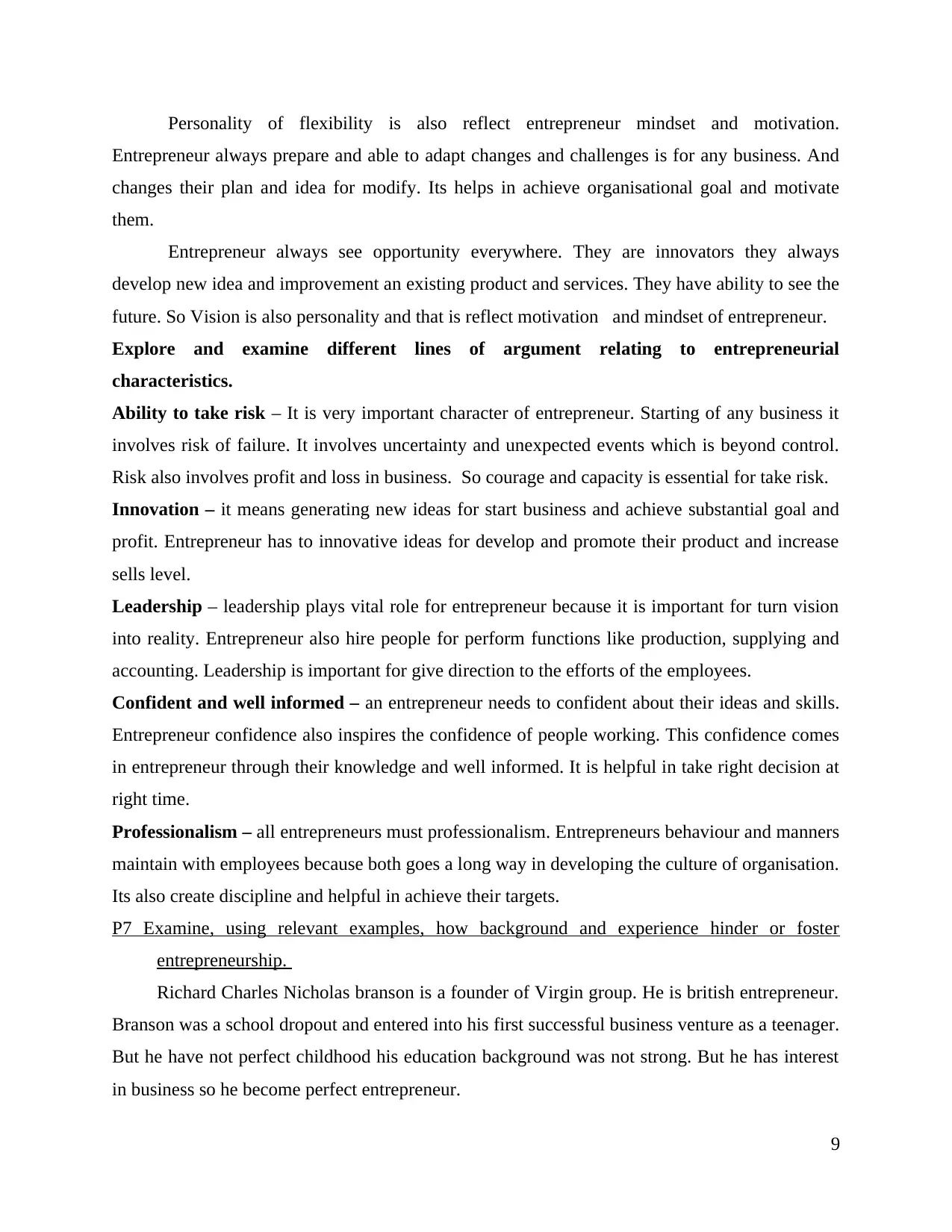
Personality of flexibility is also reflect entrepreneur mindset and motivation.
Entrepreneur always prepare and able to adapt changes and challenges is for any business. And
changes their plan and idea for modify. Its helps in achieve organisational goal and motivate
them.
Entrepreneur always see opportunity everywhere. They are innovators they always
develop new idea and improvement an existing product and services. They have ability to see the
future. So Vision is also personality and that is reflect motivation and mindset of entrepreneur.
Explore and examine different lines of argument relating to entrepreneurial
characteristics.
Ability to take risk – It is very important character of entrepreneur. Starting of any business it
involves risk of failure. It involves uncertainty and unexpected events which is beyond control.
Risk also involves profit and loss in business. So courage and capacity is essential for take risk.
Innovation – it means generating new ideas for start business and achieve substantial goal and
profit. Entrepreneur has to innovative ideas for develop and promote their product and increase
sells level.
Leadership – leadership plays vital role for entrepreneur because it is important for turn vision
into reality. Entrepreneur also hire people for perform functions like production, supplying and
accounting. Leadership is important for give direction to the efforts of the employees.
Confident and well informed – an entrepreneur needs to confident about their ideas and skills.
Entrepreneur confidence also inspires the confidence of people working. This confidence comes
in entrepreneur through their knowledge and well informed. It is helpful in take right decision at
right time.
Professionalism – all entrepreneurs must professionalism. Entrepreneurs behaviour and manners
maintain with employees because both goes a long way in developing the culture of organisation.
Its also create discipline and helpful in achieve their targets.
P7 Examine, using relevant examples, how background and experience hinder or foster
entrepreneurship.
Richard Charles Nicholas branson is a founder of Virgin group. He is british entrepreneur.
Branson was a school dropout and entered into his first successful business venture as a teenager.
But he have not perfect childhood his education background was not strong. But he has interest
in business so he become perfect entrepreneur.
9
Entrepreneur always prepare and able to adapt changes and challenges is for any business. And
changes their plan and idea for modify. Its helps in achieve organisational goal and motivate
them.
Entrepreneur always see opportunity everywhere. They are innovators they always
develop new idea and improvement an existing product and services. They have ability to see the
future. So Vision is also personality and that is reflect motivation and mindset of entrepreneur.
Explore and examine different lines of argument relating to entrepreneurial
characteristics.
Ability to take risk – It is very important character of entrepreneur. Starting of any business it
involves risk of failure. It involves uncertainty and unexpected events which is beyond control.
Risk also involves profit and loss in business. So courage and capacity is essential for take risk.
Innovation – it means generating new ideas for start business and achieve substantial goal and
profit. Entrepreneur has to innovative ideas for develop and promote their product and increase
sells level.
Leadership – leadership plays vital role for entrepreneur because it is important for turn vision
into reality. Entrepreneur also hire people for perform functions like production, supplying and
accounting. Leadership is important for give direction to the efforts of the employees.
Confident and well informed – an entrepreneur needs to confident about their ideas and skills.
Entrepreneur confidence also inspires the confidence of people working. This confidence comes
in entrepreneur through their knowledge and well informed. It is helpful in take right decision at
right time.
Professionalism – all entrepreneurs must professionalism. Entrepreneurs behaviour and manners
maintain with employees because both goes a long way in developing the culture of organisation.
Its also create discipline and helpful in achieve their targets.
P7 Examine, using relevant examples, how background and experience hinder or foster
entrepreneurship.
Richard Charles Nicholas branson is a founder of Virgin group. He is british entrepreneur.
Branson was a school dropout and entered into his first successful business venture as a teenager.
But he have not perfect childhood his education background was not strong. But he has interest
in business so he become perfect entrepreneur.
9
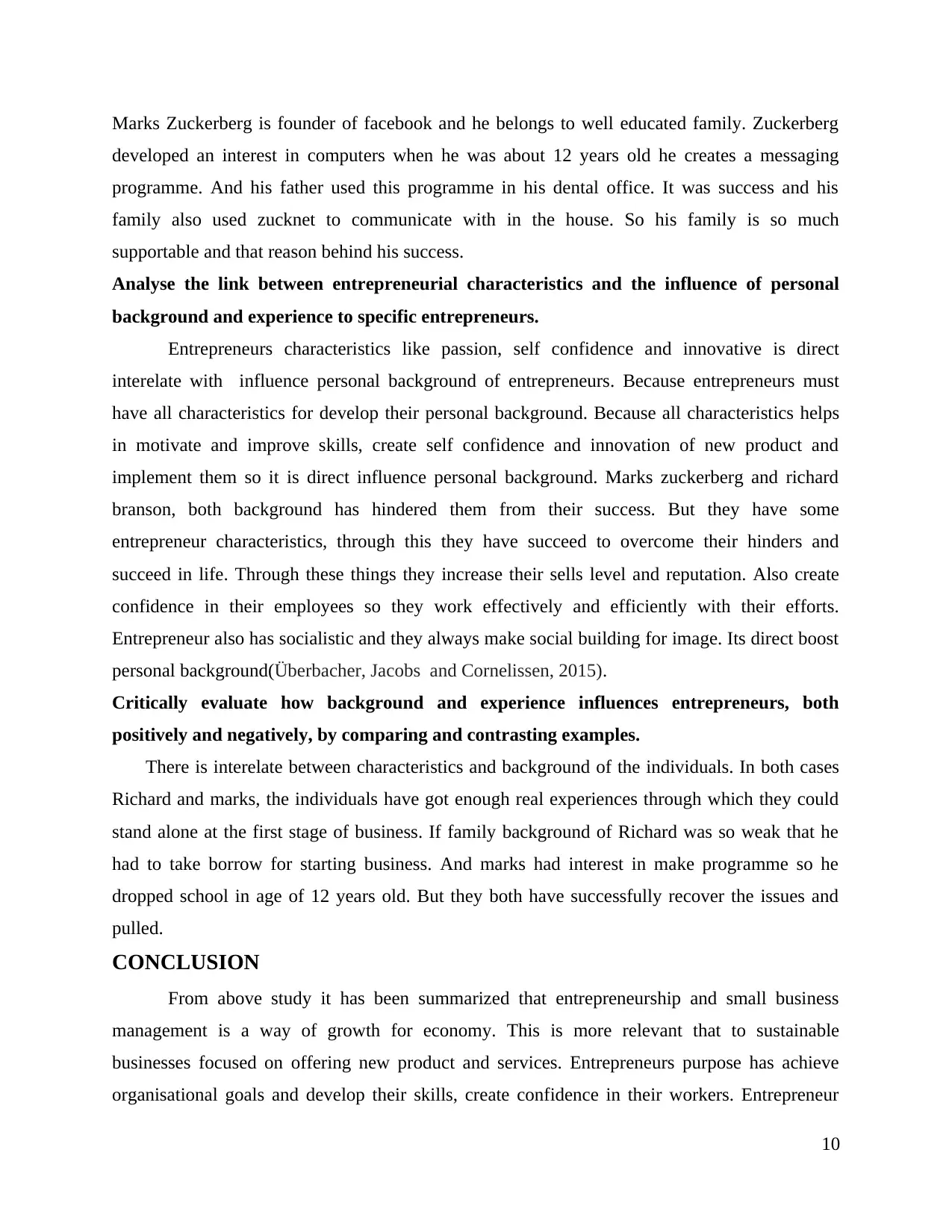
Marks Zuckerberg is founder of facebook and he belongs to well educated family. Zuckerberg
developed an interest in computers when he was about 12 years old he creates a messaging
programme. And his father used this programme in his dental office. It was success and his
family also used zucknet to communicate with in the house. So his family is so much
supportable and that reason behind his success.
Analyse the link between entrepreneurial characteristics and the influence of personal
background and experience to specific entrepreneurs.
Entrepreneurs characteristics like passion, self confidence and innovative is direct
interelate with influence personal background of entrepreneurs. Because entrepreneurs must
have all characteristics for develop their personal background. Because all characteristics helps
in motivate and improve skills, create self confidence and innovation of new product and
implement them so it is direct influence personal background. Marks zuckerberg and richard
branson, both background has hindered them from their success. But they have some
entrepreneur characteristics, through this they have succeed to overcome their hinders and
succeed in life. Through these things they increase their sells level and reputation. Also create
confidence in their employees so they work effectively and efficiently with their efforts.
Entrepreneur also has socialistic and they always make social building for image. Its direct boost
personal background(Überbacher, Jacobs and Cornelissen, 2015).
Critically evaluate how background and experience influences entrepreneurs, both
positively and negatively, by comparing and contrasting examples.
There is interelate between characteristics and background of the individuals. In both cases
Richard and marks, the individuals have got enough real experiences through which they could
stand alone at the first stage of business. If family background of Richard was so weak that he
had to take borrow for starting business. And marks had interest in make programme so he
dropped school in age of 12 years old. But they both have successfully recover the issues and
pulled.
CONCLUSION
From above study it has been summarized that entrepreneurship and small business
management is a way of growth for economy. This is more relevant that to sustainable
businesses focused on offering new product and services. Entrepreneurs purpose has achieve
organisational goals and develop their skills, create confidence in their workers. Entrepreneur
10
developed an interest in computers when he was about 12 years old he creates a messaging
programme. And his father used this programme in his dental office. It was success and his
family also used zucknet to communicate with in the house. So his family is so much
supportable and that reason behind his success.
Analyse the link between entrepreneurial characteristics and the influence of personal
background and experience to specific entrepreneurs.
Entrepreneurs characteristics like passion, self confidence and innovative is direct
interelate with influence personal background of entrepreneurs. Because entrepreneurs must
have all characteristics for develop their personal background. Because all characteristics helps
in motivate and improve skills, create self confidence and innovation of new product and
implement them so it is direct influence personal background. Marks zuckerberg and richard
branson, both background has hindered them from their success. But they have some
entrepreneur characteristics, through this they have succeed to overcome their hinders and
succeed in life. Through these things they increase their sells level and reputation. Also create
confidence in their employees so they work effectively and efficiently with their efforts.
Entrepreneur also has socialistic and they always make social building for image. Its direct boost
personal background(Überbacher, Jacobs and Cornelissen, 2015).
Critically evaluate how background and experience influences entrepreneurs, both
positively and negatively, by comparing and contrasting examples.
There is interelate between characteristics and background of the individuals. In both cases
Richard and marks, the individuals have got enough real experiences through which they could
stand alone at the first stage of business. If family background of Richard was so weak that he
had to take borrow for starting business. And marks had interest in make programme so he
dropped school in age of 12 years old. But they both have successfully recover the issues and
pulled.
CONCLUSION
From above study it has been summarized that entrepreneurship and small business
management is a way of growth for economy. This is more relevant that to sustainable
businesses focused on offering new product and services. Entrepreneurs purpose has achieve
organisational goals and develop their skills, create confidence in their workers. Entrepreneur
10
⊘ This is a preview!⊘
Do you want full access?
Subscribe today to unlock all pages.

Trusted by 1+ million students worldwide
1 out of 15
Related Documents
Your All-in-One AI-Powered Toolkit for Academic Success.
+13062052269
info@desklib.com
Available 24*7 on WhatsApp / Email
![[object Object]](/_next/static/media/star-bottom.7253800d.svg)
Unlock your academic potential
Copyright © 2020–2026 A2Z Services. All Rights Reserved. Developed and managed by ZUCOL.





